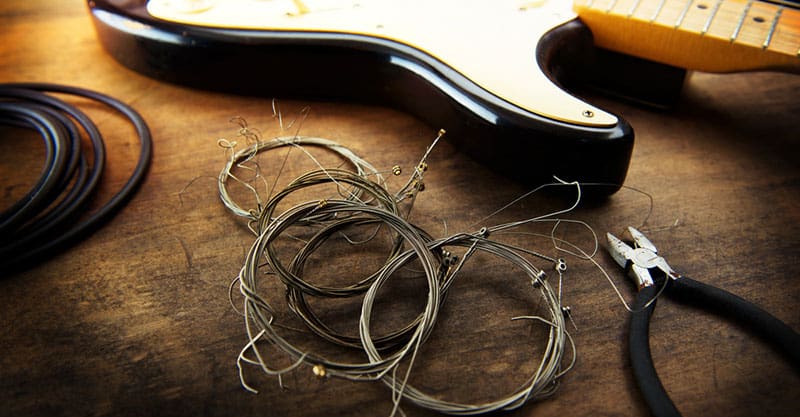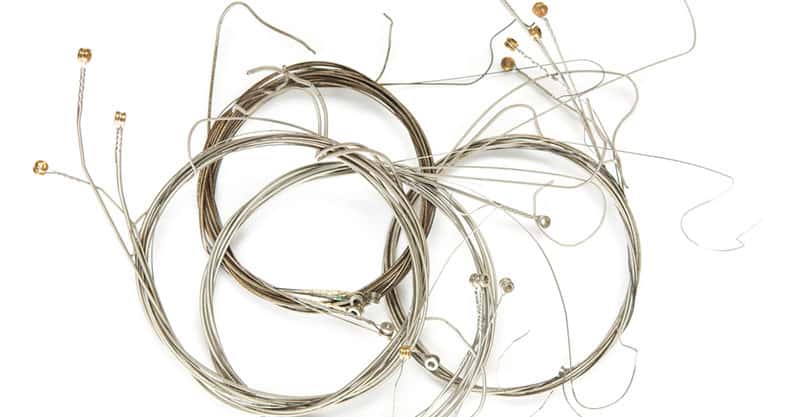
If you’ve been playing guitar for a while, you’ll likely have changed your strings a few times. Inevitably, you’ve probably ended up with quite the collection of coiled-up used guitar strings.
What can you do with these used strings? If you’re environmentally conscious, you’ve likely wondered whether guitar strings are recyclable. The short answer is, they are. However, your local recycling plant may not accept them (which is why it is wise to call ahead of time).
However, there are a number of different options available if you want to recycle your used strings. Read on to learn about the different possibilities available.
Table of Contents
Why You Should Care About Properly Recycling Used Guitar Strings
There are a number of reasons why responsible guitar players should take the proper care to recycle their used strings. Much of these reasons have to do with the environment.
If you take a moment to think about the mass production of guitar products, you’ll quickly realize the impact the industry has on climate change.
As guitar strings are made of metallic products, carbon dioxide is an inevitable by-product of the manufacturing process. However, there is also the likelihood that Mercury and other dangerous by-products are released during the actual mining process.
Water runoff from factories due to rain can carry these byproducts into rivers, causing damage to ecosystems as well as your drinking water.
While coated strings have been an innovative breakthrough for increasing the lifespan of the string, these types of strings pose an even greater threat to the environment. The reason for this is that many of these coatings feature Teflon.
Teflon, a fluoropolymer, was used widely in non-stick cookware due to its water-resistant properties. However, in recent years, it has come to light that PFAS chemicals are needed in the process of creating Teflon. PFAS chemicals are also commonly referred to as ‘forever chemicals', because they take an extremely long time to break down in nature.
What eventually happens is that these chemicals accumulate (and have been) over time, causing the chemical to find its way into the bodies of nearly every living species on Earth. This can have extremely detrimental effects, including increased risks of cancers and immune system damage.
The unfortunate reality is that most people already have PFAS chemicals in their system, with an estimated 98% of Americans likely affected due to contaminated drinking water. While this may seem overwhelming, there is yet another reason to take extra care to recycle your strings.
If you were to simply throw your guitar strings away in the trash, they will end up in a landfill. Landfills are an unfortunate method of waste management used around the world, as many of the items buried in a landfill will take generations of time to completely break down.
While it may seem small, opting not to allow your guitar strings to go to the landfill means one less thing for the Earth to break down and reclaim.
You might wonder why you should care if most of the environmental mishaps come from the production side of things, and rightfully so. The truth is, your purchases determine whether certain practices remain commonplace in the industry. The actions you take after your purchases are directly your responsibility.
How To Recycle Your Guitar Strings

Currently, there is only one way to actually recycle your guitar strings, which is through the Playback program through D’Addario strings. The program, operated through a partnership with TerraCycle, has recycled over 6 million strings to date. Once you have collected 2 pounds (minimum) of used strings, you can ship it directly to D’Addario.
To ease the process, D’Addario will give you a shipping label for free so that all you have to worry about is the shipping container. In exchange for your strings, you will receive rewards points via D’Addario’s Player Circle. These points can be redeemed for a number of different items including strings, clothing, and other accessories.
Of course, accumulating at least 2 pounds of used strings is no small feat. If you would like to recycle your strings before you reach that mark, there are plenty of music store retailers that take part in the program.
Simply drive to your nearest location offering the Playback recycling program, and you will find a kiosk. This kiosk allows you to place your used strings in the internal receptacle.
If you own a music-related store, D’Addario offers the opportunity to become a partner in the Playback program. All you need to do is sign up, order a receptacle, and place it in a visible location whilst promoting the fact that you have it in-store. After 15 pounds have been collected in the bin, you can ship it to D’Addario for free.
This is a great initiative taken by one of the biggest string manufacturers in the industry, as it shows the willingness to take responsibility in helping the environmental impact that is present. It should be noted that this program is not limited to guitar strings, as it accepts orchestral strings and bass strings as well.
Other Ways To Recycle Guitar Strings
Aside from actually recycling the guitar strings, there are plenty of ways that used guitar strings can be repurposed. Some of these ideas may not be ideal for your individual needs, but there is likely somebody that would be glad to receive them for these purposes.
The first way that you could repurpose used guitar strings is by using them to create jewelry. Bracelets, necklaces, and rings can be easily made using strings, giving you an opportunity to create something unique out of something ordinary.
Another way you can repurpose these strings is by donating them to other artists who specialize in creating jewelry. Wire wrapping has become increasingly popular, with artists creating unique wraps to adorn crystals and other ornamental pieces. While many of these people opt to use colloidal silver, it doesn’t hurt to reach out, as guitar strings could provide the interesting flair they have been searching for.
If you keep your eyes open, you might also come across donation drives that are specifically tailored to collecting used guitar strings. In the past, such drives have collected strings to create jewelry and art for the purpose of charity auctions. Your used strings could potentially make an impact where monetary funds are needed most.
There are some ways you can reuse strings at home as well. One of the most accessible ways to use your strings is by using them to hang pictures and paintings on your wall. Many canvases do not come equipped with hanging equipment. With the proper attachments, the guitar string can provide the needed stability to mount a piece of art on your wall.
As a guitarist, you likely know how valuable having a perfectly set up guitar is to your playing comfort. You’ve also likely experienced the fact that guitars frequently change and adjust to different weather conditions.
How do used strings come into play with guitar setups? When measuring your string action, you will need to use a feeler gauge to know how much space is between the frets of your guitar and the bottom of your strings.
As strings are conveniently gauged to certain sizes, you can use these old strings to quickly check your action without necessarily having to purchase a feeler gauge.
Are Guitar Strings Recyclable? Final Thoughts
Dealing with used strings is one of the realities of being a guitarist, and if you play quite frequently, your collection of used strings will grow to a massive size over time. Fortunately, there are easy methods available to recycle your guitar strings.
Recycling your used strings is especially important with the effects of climate change becoming more apparent every day. It is unfortunate that it took until recent years for there to be a recycling program available to guitarists.
However, this is something to take advantage of. As guitarists, it is our responsibility to ensure our strings are properly taken care of, no matter which method we choose to recycle them.
Side note, do you want to learn to play guitar songs the easy way? Learn how here – results are guaranteed!